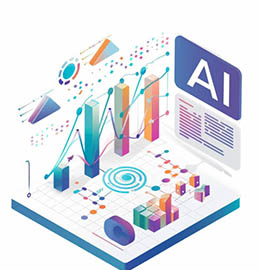Centre for Software and Information Technology Management (CSITM) at IIMB examines role of AI and data analytics in shaping electoral processes

The panel of leading experts discussed, ‘The Future of Elections: Shaping Research and Election Strategies through AI and Data Analytics.’
28 August, 2024, Bengaluru: The Centre for Software and Information Technology Management (CSITM) at IIM Bangalore hosted a thought-provoking panel discussion on August 21, 2024, titled, ‘The Future of Elections: Shaping Research and Election Strategies through AI and Data Analytics’. The session brought together leading experts—Dr. Christopher Wlezien, Hogg Professor of Government, The University of Texas; Dr. Ananya Sen, Alfred Blumstein Career Development Associate Professor, Carnegie Mellon University; Dr. Connor T. Jerzak, Assistant Professor, Department of Government, The University of Texas; and Dr. Kokil Jaidka, Assistant Professor in Computational Communication, National University of Singapore—to explore the transformative role of AI and data analytics in the electoral process.
Moderated by Shivam Srivastava, Research Associate at IIM Bangalore, the discussion covered a broad spectrum of topics, ranging from the ethical implications of AI in elections to the role of machine learning in predictive democracy.
Dr. Christopher Wlezien discussed the variability in polling accuracy across different electoral systems and party sizes. His analysis provided valuable insights into the institutional and party traits that influence election predictions, enhancing the understanding of polling data in diverse democratic settings.
Dr. Ananya Sen explored the impact of digital platforms on politics. Dr. Sen’s research further reinforced how social media, particularly platforms like Twitter, can lower entry barriers for new political candidates and examined the financial dynamics of online misinformation. He emphasized the need for increased transparency and accountability in digital advertising.
Dr. Connor T. Jerzak presented on strategic candidate profiling. His insights into what makes a candidate appealing, along with the influence of competition and strategic rules, offered new perspectives on election analysis.
Dr. Kokil Jaidka addressed the critical issue of misinformation in South Asia. She underscored the importance of creating region-specific interventions to combat fake news, testing these through field experiments, and supporting fact-checkers, especially in underrepresented languages.
The panellists also touched upon the potential of AI to refine poll accuracy as elections approach, the risks of increased polarization due to AI-driven media algorithms, and the challenges AI faces in accurately modelling voter behaviour and party dynamics. In closing, each of the speakers reiterated their conviction on usage of AI in varied aspects including electoral betting and underscored the importance of the safeguards and making the system equitable.
The webinar concluded with a Q&A session, where participants engaged with the panellists on these critical issues. The event was a significant success, fostering a deeper understanding of how AI and data analytics are reshaping the landscape of elections and offering a glimpse into the future of democratic engagement.
For the complete video, please visit: https://www.youtube.com/live/1R_ajGoPGL0?si=EEs_XnPvndrmqiHy
Centre for Software and Information Technology Management (CSITM) at IIMB examines role of AI and data analytics in shaping electoral processes
The panel of leading experts discussed, ‘The Future of Elections: Shaping Research and Election Strategies through AI and Data Analytics.’
28 August, 2024, Bengaluru: The Centre for Software and Information Technology Management (CSITM) at IIM Bangalore hosted a thought-provoking panel discussion on August 21, 2024, titled, ‘The Future of Elections: Shaping Research and Election Strategies through AI and Data Analytics’. The session brought together leading experts—Dr. Christopher Wlezien, Hogg Professor of Government, The University of Texas; Dr. Ananya Sen, Alfred Blumstein Career Development Associate Professor, Carnegie Mellon University; Dr. Connor T. Jerzak, Assistant Professor, Department of Government, The University of Texas; and Dr. Kokil Jaidka, Assistant Professor in Computational Communication, National University of Singapore—to explore the transformative role of AI and data analytics in the electoral process.
Moderated by Shivam Srivastava, Research Associate at IIM Bangalore, the discussion covered a broad spectrum of topics, ranging from the ethical implications of AI in elections to the role of machine learning in predictive democracy.
Dr. Christopher Wlezien discussed the variability in polling accuracy across different electoral systems and party sizes. His analysis provided valuable insights into the institutional and party traits that influence election predictions, enhancing the understanding of polling data in diverse democratic settings.
Dr. Ananya Sen explored the impact of digital platforms on politics. Dr. Sen’s research further reinforced how social media, particularly platforms like Twitter, can lower entry barriers for new political candidates and examined the financial dynamics of online misinformation. He emphasized the need for increased transparency and accountability in digital advertising.
Dr. Connor T. Jerzak presented on strategic candidate profiling. His insights into what makes a candidate appealing, along with the influence of competition and strategic rules, offered new perspectives on election analysis.
Dr. Kokil Jaidka addressed the critical issue of misinformation in South Asia. She underscored the importance of creating region-specific interventions to combat fake news, testing these through field experiments, and supporting fact-checkers, especially in underrepresented languages.
The panellists also touched upon the potential of AI to refine poll accuracy as elections approach, the risks of increased polarization due to AI-driven media algorithms, and the challenges AI faces in accurately modelling voter behaviour and party dynamics. In closing, each of the speakers reiterated their conviction on usage of AI in varied aspects including electoral betting and underscored the importance of the safeguards and making the system equitable.
The webinar concluded with a Q&A session, where participants engaged with the panellists on these critical issues. The event was a significant success, fostering a deeper understanding of how AI and data analytics are reshaping the landscape of elections and offering a glimpse into the future of democratic engagement.
For the complete video, please visit: https://www.youtube.com/live/1R_ajGoPGL0?si=EEs_XnPvndrmqiHy
